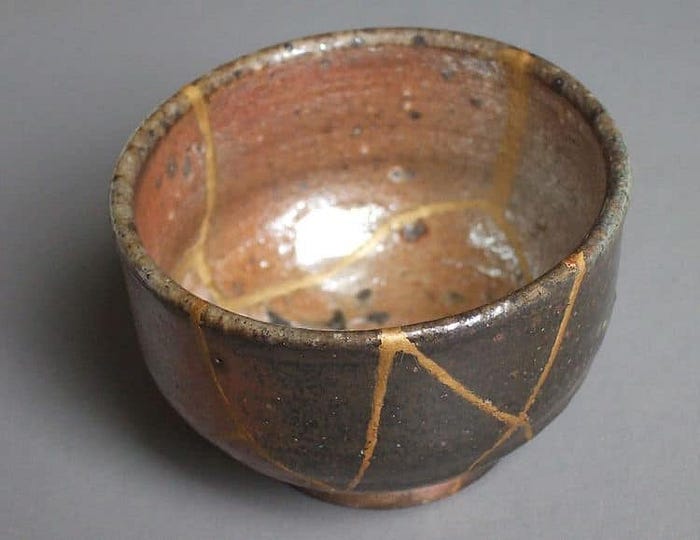Embracing imperfection
This is a repost from my blog.
Today is a little special and emotional for me.
It has been eight years since I started my spiritual journey, devoted to zen life and culture, with the intent of sharing “wabi-sabi” or “the beauty of life” in its natural form.
A long time ago, I was the Firdaus who are complaining a lot. I hate the fact that living has so many limitations and imperfections. The imperfection of life is something that upsets me and didn’t like it at all.
— why do we need to sleep? Why do we feel not enough? Why do we have to be born and die? Why do I get treatment such and such? Why do we need to work? I ask many questions, until one day I hit a very rock bottom and realized that I was living life on auto-pilot.
It was people around me — my father, my mother, my good friends who made me realize that I needed to accept the fact and focus on learning how to embrace it, instead of trying to fight against it. I was so frustrated with everything around me, that I didn’t know how to love.
— I learned to love. Why, some of you may ask? Because I had to learn to appreciate what is given to me in this life.
That was the time I fully accept myself as a human. Human is not perfect and never has been. Then I found out life is something that should be lived as it is. Life should be appreciated as it is.
That is what makes us human. and also that’s the beauty of becoming a human.
There’s time that we feel ready to conquer the world. There are also times we feel sorrow. We have ups and downs, but that is natural. We have to trust ourselves that we’ll be ready for the next challenge, or for the u-turn of life. We are all imperfect, but it is what makes us human.
— did you say? … or did you say that I should fight against the imperfection of life? … I don’t think so. I think we should accept it. Zero perfection, zero infinity.
That’s humbled me. To embrace imperfection is to see with new eyes. It is to appreciate the “red thread” that connects all things and people around you, in a web of spirals.
So, I started to observe my shortcomings and imperfections with the same admiration as the beauty of nature. This is where I learnt about the concept of embracing imperfection. This concept has bred empathy.

I’ve seen greed, jealousy, bad faith, revenge and much more.
It consumes us. It counteracts us to pessimism. But it is very difficult to let it go. I have learnt that with empathy we can let go of it with a less painful experience. When we feel the pain, but also the understanding of our betrayal or pain, that feeling can be less harsh and juster.
This has helped me to progress in life. Tremendously.
Embracing imperfection is humbling. It’s understanding that we are all the same and it’s what makes us human. It’s finding the beauty in your experiences, good and bad.
It’s seeing beauty in our experiences, good and bad. It’s understanding that life is a paradox, a moving reflection of nature.
Wabi-Sabi.
It is a simple idea that appreciates imperfection, naturalness and impermanence. It is the idea that sees life as it is, not as what we want it to be. Wabi-sabi is an ancient aesthetic philosophy rooted in Zen Buddhism. The Japanese philosophy celebrates beauty in what’s natural, flaws and all.
I feel this beautiful belief can be used in many ways for many purposes.
I have been witnessing the pasts, the progress of our world and my own personal growth — both as a person and as an entrepreneur — thanks to the unique perspective of “wabi-sabi” — an aesthetic design perspective.
With all the experiences, I came to consider how much I love this concept. It’s something simple, but it’s amazing how much it has grown in me over the years.
In our culture, “simplicity” often codes for a life that’s organized or for spare, boutique perfection.
— We confuse it with virtue, simplicity with happiness. The reality is that life’s messy. It’s not simple.

But what could be more radically simple than acceptance of rust and imperfection? I embrace the beauty in that that is perfectly imperfect, and I can embrace the fingerprints, scars, and lines of my life, too.
I find the idea of abandoning “perfect” and even “be good enough” irresistibly tempting.
I may not be the brightest, but I can let go of the best and most extraordinary to seek pleasure in the quotidian, let alone the simple.
Wabi-Sabi is a philosophy I accept wholeheartedly, and the further I celebrate it, the more it inspires me of freedom. I embrace wabi-sabi with its own elements of nature, aesthetics, and spirituality. All are linked in the universe. All are linked to each other.
— Wabi means things that are new and unprocessed. It evokes feelings of peace and tranquilly, as well as rustic charm. It encompasses both naturally occurring and artificially created objects.
— Sabi is a Japanese word that refers to an object’s beauty that comes with age. The patina of the object and its impermanence are both evident in its appearance.
I am a Wabi, not perfect, and that’s what I want for my life. I want to live in a world that’s imperfect, but full of beauty, and not just in its imperfections.

I believe that being imperfect is a gift. Wabi-Sabi is not just a belief or an idea. It is a way of life: to embrace imperfection. To embrace imperfection is to see with new eyes and to appreciate what we never noticed before. I hope to live a life of simplicity, not perfection, and to embrace the imperfections of life, even if they are my own.
I am so grateful for all the people who have approached me to share their thoughts and opinions. They have taught me so much about myself and how I was perceiving my environment — art, design, people… it is such a privilege to be able to talk about this with someone else.
